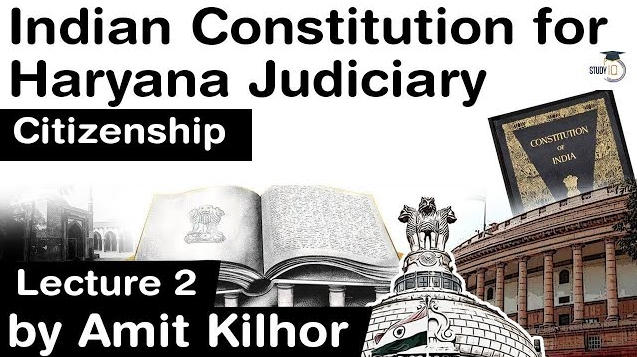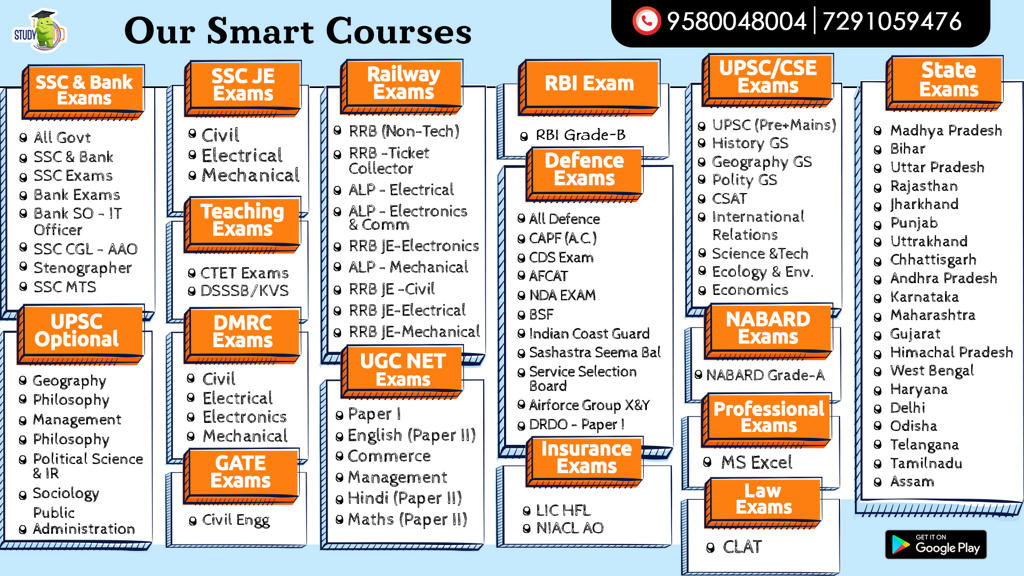Table of Contents
- Like any other modern state, India has two kinds of people–citizens and aliens. Citizens are full members of the Indian State and owe allegiance to it. They enjoy all civil and political rights. Aliens, on the other hand, are the citizens of some other state and hence, do not enjoy all the civil and political rights. They are of two categories–friendly aliens or enemy aliens.
They enjoy all civil and political rights
- Right against discrimination on grounds of religion, race, caste, sex or place of birth (Article 15).
- Right to equality of opportunity in the matter of public employment (Article 16).
- Right to freedom of speech and expression, assembly, association, movement, residence and profession (Article 19).
- Cultural and educational rights (Articles 29 and 30).
- Right to vote in elections to the Lok Sabha and state legislative assembly.
- Right to contest for the membership of the Parliament and the state legislature.
- Eligibility to hold certain public offices, that is, President of India, Vice-President of India, judges of the Supreme Court and the high courts, Governor of states, Attorney General of India and Advocate General of states
- All other rights except Article15,16,19,29,30 are enjoyed by Aliens
- However Enemy aliens they do not enjoy protection against arrest and detention (Article 22).
- In India both a citizen by birth as well as a naturalised citizen are eligible for the office of President while in USA, only a citizen by birth and not a naturalised citizen is eligible for the office of President
CONSTITUTIONAL PROVISIONS: (citizenship from Articles 5 to 11 under Part II)
- It only identifies the persons who became citizens of India at its commencement (i.e., on January 26, 1950) neither any permanent nor any elaborate provisions
- It does not deal with the problem of acquisition or loss of citizenship subsequent to its commencement empowers the Parliament to enact a law on matter relating to citizenship
ARTICLE 5
- Person who had his domicile in India and also fulfilled any one of the three conditions, viz.,
- if he was born in India;
- or if either of his parents was born in India;
- or if he has been ordinarily resident in India for five years immediately before the commencement of the Constitution, became a citizen of India
ARTICLE 6
- A person who migrated to India from Pakistan; if he or either of his parents or any of his grandparents was born in undivided India And also fullfill any of 2 conditions
- he migrated to India before July 19, 1948 , he had been ordinarily resident in India since the date of his migration
- he migrated to India before July 19, 1948, he had been ordinarily resident in India since the date of his migration (residence for 6 months before registration)
ARTICLE 7
- A person who migrated to Pakistan from India after March 1, 1947, but later returned to India for resettlement could become an Indian citizen. For this, he had to be resident in India for six months preceding the date of his application for registration
ARTICLE 8
- To sum up, these provisions deal with the citizenship of (a) persons domiciled in India; (b) persons migrated from Pakistan; (c) persons migrated to Pakistan but later returned; and (d) persons of Indian origin residing outside India.
- A person who, or any of whose parents or grandparents, was born in undivided India but who is ordinarily residing outside India shall become an Indian citizen if he has been registered as a citizen of India by the diplomatic or consular representative of India in the country of his residence, whether before or after the commencement of the Constitution. Thus, this provision covers the overseas Indians who may want to acquire Indian citizenship
- The other constitutional provisions with respect to the citizenship are as follows:
- No person shall be a citizen of India or be deemed to be a citizen of India, if he has voluntarily acquired the citizenship of any foreign state.
- Every person who is or is deemed to be a citizen of India shall continue to be such citizen, subject to the provisions of any law made by Parliament.
- Parliament shall have the power to make any provision with respect to the acquisition and termination of citizenship and all other matters relating to citizenship.
- The Citizenship Act (1955) provides for acquisition and loss of citizenship after the commencement of the Constitution.
Acquisition of Citizenship
- The Citizenship Act of 1955 prescribes five ways of acquiring citizenship, viz, birth, descent, registration, naturalisation and incorporation of territory:
- By Birth – A person born in India on or after January 26, 1950 but before July 1, 1987 is a citizen of India by birth irrespective of the nationality of his parents.
- A person born in India on or after July 1, 1987 is considered as a citizen of India only if either of his parents is a citizen of India at the time of his birth.
- Further, those born in India on or after December 3, 2004 are considered citizens of India only if both of their parents are citizens of India or one of whose parents is a citizen of India and the other is not an illegal migrant at the time of their birth.
- The children of foreign diplomats posted in India and enemy aliens cannot acquire Indian citizenship by birth.
2. By Descent
- A person born outside India on or after January 26, 1950 but before December 10, 1992 is a citizen of India by descent, if his father was a citizen of India at the time of his birth.
- A person born outside India on or after December 10, 1992 is considered as a citizen of India if either of his parents is a citizen of India at the time of his birth.
- December 3, 2004 onwards, a person born outside India shall not be a citizen of India by descent, unless his birth is registered at an Indian consulate within one year of the date of birth or with the permission of the Central Government, after the expiry of the said period.
By Registration
- on an application, register as a citizen of India any person (not being an illegal migrant) if he belongs-
- ordinarily resident in India for seven years
- person who is married to a citizen of India and is ordinarily resident in India for seven years
- registered as an overseas citizen of India cardholder for five years, and who is ordinarily resident in India for twelve months before making an application for registration
5. By Incorporation of Territory
- For example, when Pondicherry became a part of India
By Naturalisation
- on an application, grant a certificate of naturalisation to any person (not being an illegal migrant) if he-
- not a subject or citizen of any country where citizens of India are prevented from becoming subjects or citizens
- he undertakes to renounce the citizenship of Origin country in the event of his application for Indian citizenship being accepted
- resided in India or been in the service of a Government in India
- he is of good character
- adequate knowledge of a language specified in the Eighth Schedule
Loss of citizenship
1. By Renunciation
- Any citizen of India of full age and capacity can make a declaration renouncing his Indian citizenship
- If such a declaration is made during a war in which India is engaged, its registration shall be withheld by the Central Government
- when a person renounces his Indian citizenship, every minor child of that person also loses Indian citizenship. However, when such a child attains the age of eighteen, he may resume Indian citizenship
2. By Termination
- When an Indian citizen voluntarily (consciously, knowingly and without duress, undue influence or compulsion) acquires the citizenship of another country, his Indian citizenship automatically terminates. This provision, however, does not apply during a war in which India is engaged.
By Deprivation
- It is a compulsory termination of Indian citizenship by the Central government, if: (a) the citizen has obtained the citizenship by fraud: (b) the citizen has shown disloyalty to the Constitution of India: (c) the citizen has unlawfully traded or communicated with the enemy during a war; (d) the citizen has, within five years after registration or naturalisation, been imprisoned in any country for two years; and (e) the citizen has been ordinarily resident out of India for seven years continuously
OVERSEAS CITIZENSHIP OF INDIA
- In September 2000, the Government of India (Ministry of External Affairs) had set-up a High Level Committee on the Indian Diaspora under the Chairmanship of L.M. Singhvi
- It recommended the amendment of the Citizenship Act (1955) to provide for grant of dual citizenship to the Persons of Indian Origin (PIOs) belonging to certain specified countries
- Citizenship (Amendment) Act, 2005, expanded the scope of grant of OCI for PIOs of all countries except Pakistan and Bangladesh as long as their home countries all dual citizenship under their local laws (OCI is not actually a dual citizenships as the Indian Constitution forbids dual citizenship or dual nationality (Article 9)
- OCI card scheme was introduced in December 2, 2005.
- The Citizenship (Amendment) Act, 2015, replaced the nomenclature of “Overseas Citizen of India” with that of “Overseas Citizen of India Cardholder”(OCIC)


Haryana Judiciary Exams 2021 | Free PDF Download






















 WhatsApp
WhatsApp